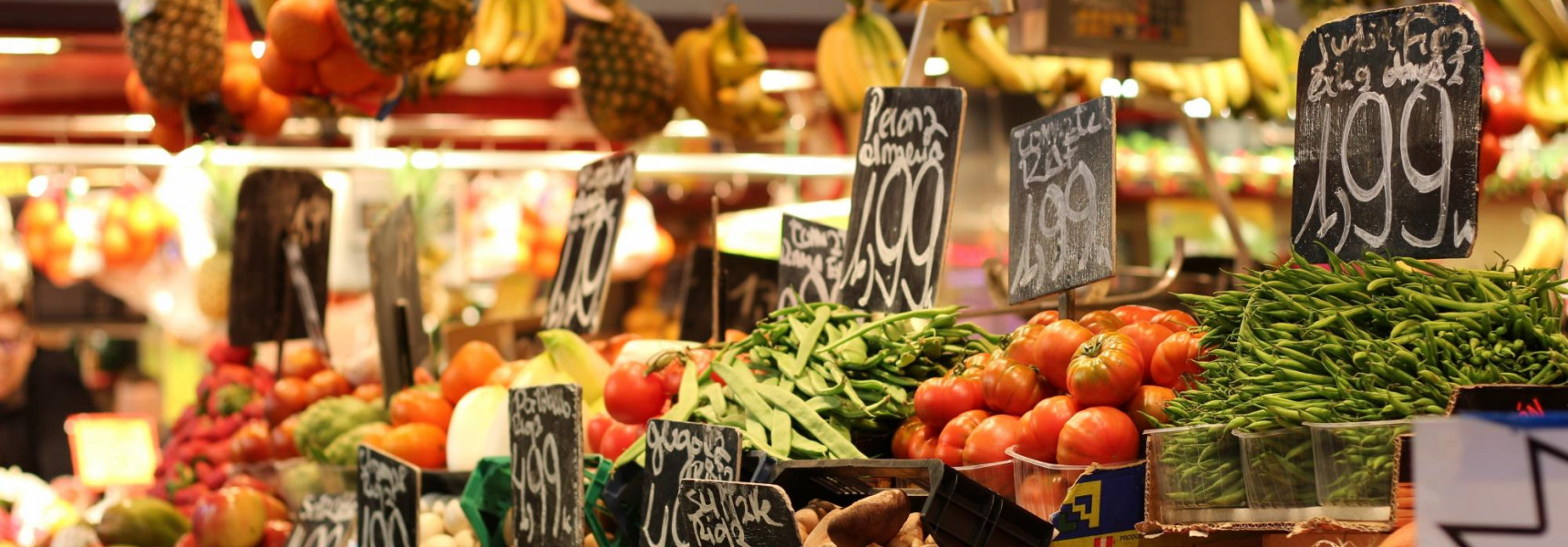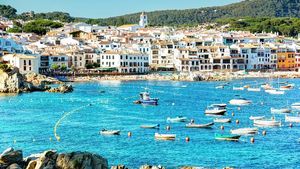Food and Drink Tours
Barcelona
Published: 09 Jan 2024
Are you looking to have a unique and thought-provoking experience on your next food tour of Barcelona? If so, it's worth exploring the various sustainability policies that are being implemented in the city.
From composting programs to reusable containers, Barcelona is strongly committed to enhancing its environmental footprint while still preserving its vibrant culinary culture. In this blog post, we'll provide an overview of some of the key initiatives taking place in the city and how they might affect your upcoming food tour plans. Get ready for an eye-opening adventure through one of Europe’s most dynamic cities!

Food Sustainability Policies in Barcelona
For instance, Barcelona has launched several initiatives to reduce food waste and promote composting. Furthermore, the city has encouraged the development of urban agriculture and has provided incentives for restaurants and food businesses to use local and organic produce. These efforts have resulted in an increase in Barcelona Food Tours - an experience that not only showcases the rich culture and history of the city but also highlights the commitment of its people towards food sustainability. Barcelona truly is a model for other cities around the world striving to achieve a more sustainable food system.
Here is an insight into some of the food sustainability policies that have been implemented in Barcelona and the effect on its local community and businesses.
Food Waste Reduction
In our world, food waste is a major issue that cannot be ignored. Fortunately, various initiatives have been put in place to mitigate this problem. For example, some grocery stores now have surplus food programs in place that allow customers to purchase discounted items that are nearing their expiration dates. Additionally, restaurants can donate their surplus food to shelters, food banks and other nonprofit organisations. In an effort to reduce food waste and promote sustainability, some cities have implemented composting programs. Individuals can also take steps to reduce food waste by being mindful of their portion sizes and storing food properly. While there is still a long way to go, these initiatives are promising steps towards a more sustainable future.
Barcelona's "Zero Waste" plan is a comprehensive strategy to reduce waste and promote sustainable resource management, targeting a 50% reduction in municipal waste by 2030. Under this plan, the city has implemented several initiatives to reduce food waste, such as the "Market of Second Opportunities," which redistributes unsold and surplus food from markets to local food banks and non-profit organisations. The city has also established a food recovery network and has partnered with local businesses to pilot a food recovery program in commercial areas.
Barcelona's food waste reduction initiatives have had a significant impact on the food industry. Here's how it has affected the industry:
Reduced Food Waste
By implementing several initiatives to reduce food waste, Barcelona has raised awareness about the issue and encouraged organizations and individuals to act. Reducing food waste means less food is thrown away, which could save money for businesses, reduce costs for consumers and reduce the environmental impacts associated with food production.
Increased Availability of Surplus Food
The "Market of Second Opportunities" initiative has helped to reduce food waste by redistributing surplus food to local food banks and non-profit organizations. This has increased the availability of food for those in need, and reduced food insecurity in the city. Businesses also benefit from this initiative by reducing the amount of food they waste while supporting local communities.
Promotion of Sustainable Food Practices
Barcelona's food waste reduction initiatives have promoted sustainable food practices, such as composting and using food waste to produce energy. This has inspired many businesses in the food industry to adopt similar practices, which can save money, reduce environmental impacts, and improve the efficiency of their operations.
Improved Reputation
Reducing food waste has improved the reputation of many businesses in the food industry in Barcelona, including restaurants, markets, and grocery stores. Customers are more likely to support businesses that prioritize sustainability and social responsibility. This can increase customer loyalty, attract new customers, and enhance the overall reputation of the food industry in the city.
Overall, the food waste reduction initiatives in Barcelona have helped to reduce food waste, increased the availability of surplus food, promoted sustainable food practices, and improved the reputation of businesses in the food industry. These initiatives are helping to create a more sustainable and responsible food system in the city.

Promotion of Local and Organic Produce
The "Barcelona Agroecology and Food" plan aims to promote agroecology and local food systems in the city. The plan seeks to increase the production and distribution of ecologically grown produce, strengthen local markets and shorten supply chains. Barcelona has implemented several policies to support this, such as providing land for urban gardens and establishing municipal food markets for local producers. The city has also incorporated organic and local food sourcing policies in public procurement contracts, influencing the suppliers to prioritize the procurement of environmentally friendly products.
By sourcing goods and services from within the city, Barcelona not only supports its local businesses and workforce but also reduces its carbon footprint by minimising transportation emissions. In addition, local sourcing helps to preserve the city's vibrant culture and unique identity, as small businesses provide a variety of locally-made products and services, including artisanal crafts, locally-grown produce and regional cuisine. By prioritising local sourcing, Barcelona is not only able to benefit its economy and environment, but also ensure a more vibrant and sustainable future for the city and its inhabitants.
Barcelona's promotion of local and organic produce has had a significant impact on the food industry. Here are a few key ways it has affected the industry:
Support for Local Farmers and Businesses
By promoting local and organic produce, Barcelona is supporting its local farmers and small businesses. This helps to strengthen the local economy and create jobs in the food industry. It also allows consumers to have a more direct relationship with their food sources and creates a sense of community around food.
Reduced Environmental Impact
Using local and organic produce reduces the environmental impact of the food industry. Shorter supply chains mean less fuel is needed for transportation, and organic farming practices reduce the use of harmful pesticides and fertilizers. This makes the industry more sustainable and helps to reduce greenhouse gas emissions.
Improved Health and Nutrition
Local and organic produce tends to be fresher and higher in nutrients than produce that has been transported long distances or grown with synthetic fertilizers. By promoting these types of foods, Barcelona is encouraging a healthier and more nutritious diet for its residents.
Increased Awareness of Food Issues
By promoting local and organic produce, Barcelona is bringing attention to issues such as food security, food waste, and the importance of sustainable agriculture. This raises public awareness and encourages consumers to think more critically about their food choices.
Overall, promoting local and organic produce in Barcelona has had a positive impact on the food industry. It has supported local businesses, reduced environmental impact, and improved health and nutrition while raising awareness of important food issues.

Promotion of Sustainable Food Practices
The "Good Food Strategy" is a comprehensive plan to promote sustainable food practices in Barcelona's cafes and restaurants. The plan includes initiatives such as "Sustainable Sunday," which promotes local and organic produce and recycled packaging, and "Plates 2-Euros," a program that encourages restaurants to offer affordable, healthy, and sustainable meals. The city has also developed a "Sustainable Food Guide" for restaurants, which offers guidelines and support for implementing sustainable food practices.
Barcelona has made great strides in promoting sustainability in its food industry through these and other initiatives. The city's food policies offer a model for other cities around the world to follow in creating a more sustainable and responsible food system.
Barcelona's promotion of sustainable food practices has had a significant impact on the food industry. Here are a few key ways it has affected the industry:
Adoption of Sustainable Practices
By promoting sustainable food practices, Barcelona has encouraged businesses in the food industry to adopt new methods. These practices include composting, using biodegradable packaging, reducing waste, and sourcing local and organic produce. As a result, these businesses have reduced their environmental impact, improved their reputation, and attracted new customers.
Increased Awareness of Sustainability
Barcelona's promotion of sustainable food practices has raised awareness about sustainability issues, such as climate change, food waste, and resource management. This has encouraged businesses and customers to think more critically about their impact on the environment and make changes that reduce their carbon footprint.
Improved Public Health
Barcelona's Sustainable Food Guide encourages restaurants to offer healthier and more sustainable meals, which improves public health and nutrition. Customers are more likely to eat nutritious meals when they dine out, which can help to reduce the incidence of chronic diseases and improve overall public health.
Reduced Environmental Impact
By promoting sustainable food practices, Barcelona has reduced the environmental impact of the food industry. Businesses have implemented practices that reduce waste, conserve resources, and reduce greenhouse gas emissions. This makes the food industry more sustainable and helps to achieve Barcelona's goal of becoming a more environmentally conscious city.
As we become more aware of the impact our choices have on the world around us, consumers are increasingly looking to make more sustainable food choices. From opting for organic produce to choosing products with minimal packaging, people are taking steps to reduce their environmental impact. This shift in attitudes is having a significant impact on the food industry, with producers adapting to meet the demand for eco-friendly products. By making sustainable choices, consumers are not only helping to protect the planet, but also encouraging businesses to adopt more responsible practices. It's a win-win situation that's helping to create a greener and more sustainable future for us all.
The world is constantly evolving and it is important that we all do our part to protect the environment. Local authorities all over the world have taken it upon themselves to promote more sustainable practices within their communities. These strategies take various forms, from encouraging renewable energy production to the implementation of new waste management techniques. Some local authorities have implemented community programs that promote recycling and composting, while others have launched educational campaigns to increase awareness on the importance of conserving resources. It is heartening to see local authorities taking the lead in promoting sustainable practices and it is hoped that their efforts will inspire individuals to do their part in preserving the planet for future generations.
Food Tours with Sustainability Policies in Barcelona
In conclusion, Barcelona's policies on food sustainability are a model for any other municipality that wants to pursue effective environmental and economic changes. The city has a long history of taking initiatives to reduce waste, source locally and prioritise health. Furthermore, consumer attitudes towards sustainable food have taken an important role on the way in which local authorities have implemented strategies to encourage more responsible practices. Book a local food tour in Barcelona with tabl.com.
Visiting Barcelona for the First Time
Planning your first trip visiting Barcelona? Enhance your experience with these amazing travel tips from this article Visiting Barcelona for the First Time
Keep exploring...
Find more amazing tabl. experiences to visit















